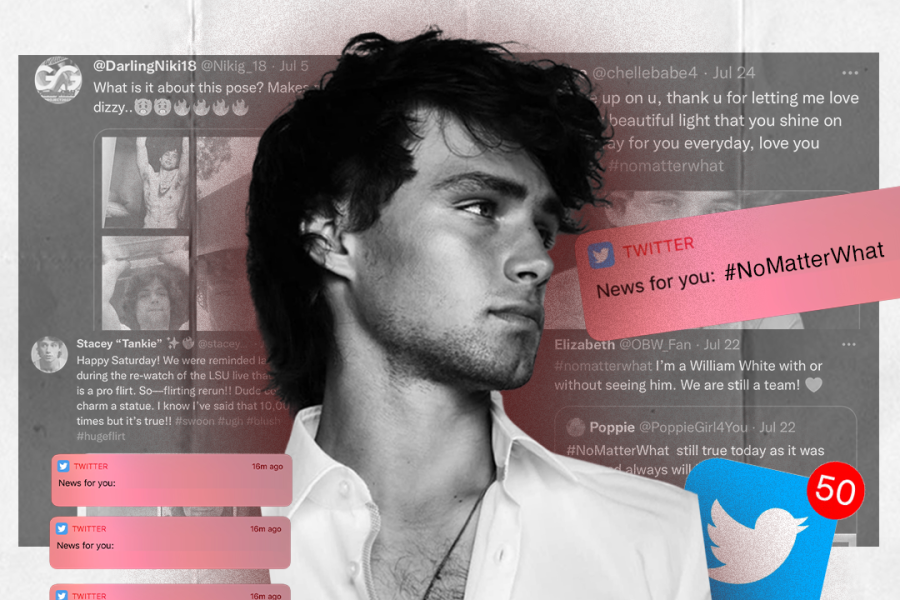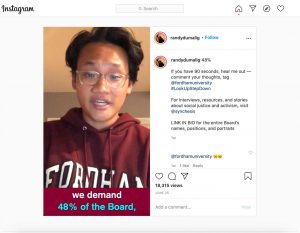The Women of #WhiteyyNation
A case study in parasocial relationships, courtesy of Canadian TikToker William White
August 9, 2022
If you have been around me for longer than 10 minutes, you know that I tend to fall into internet rabbit holes. I get swept up in niche trends or communities, and then I explain them at length to anyone who will listen. This article will be no different.
In March 2022, I read an Input Magazine article detailing the life and times of William White, a 22-year-old Canadian TikToker who got his following in a typical TikTok way: lip-syncing to songs while being hot. But the catch is that the overwhelming majority of his fans are middle-aged women.
These fans act like K-pop Twitter stans, using pictures of White as their profile pictures, replying instantly to his posts and making edits of him soundtracked by ’70s and ’80s hits.
Those songs are what drew this unlikely cohort of women to White in the first place — he posted a TikTok featuring Barry Manilow’s “Mandy” (an event that looms so large in the fandom’s collective memory that they’ve marked the anniversary), and suddenly women were flocking to his account, reminded of old flings and excited that younger generations still enjoy the music of their youth.
Over the past few months, I have been consistently checking in on his fanbase, known as Whiteyy Nation. You might ask if I don’t have other (better) things to do with my time, and the answer is, undoubtedly, yes. But I think White reflects something important about our culture and its relationship with celebrities, and the community that has formed around White on social media, especially on Twitter, fascinates me.
Inside Look at Whiteyy Nation
The fanbase’s unusual demographic is highlighted by their disregard for common social media etiquette, tagging White in every thirst tweet and in every thread. A combination of elementary school declarations of infinite love and distinctively out-of-touch uses of current slang fill White’s mentions. They refer to his Tweets as “twexts,” reminding me of when I insisted on referring to emails as texts in fifth grade because I was upset I didn’t have a phone. His fans treat the famously public arena of social media as a wholly personal affair, responding to White’s vaguely suggestive bait with surprisingly raunchy comments as if they were for White’s eyes only.
These women have oceans of faith in White. They take every offhanded comment personally and with heartbreaking sincerity: His declarations of “I love my fans!” become a promise that he and his team of fans will be together forever.
One of the most popular fans goes by the nickname Tankie, which I initially thought meant she was identifying herself as an authoritarian communist but apparently means she is the resident enthusiast of White’s tank tops, documenting every appearance.
There’s also the “Woogle” account, which posits itself as a combination archive and search engine for all things William White. Woogle posts tutorials like how to save TikToks and how to hide your favorite pictures of White on your phone (presumably from disgruntled husbands), serving as a stark reminder that White’s avid fans are wives, mothers and grandmothers.
These women have oceans of faith in White. They take every offhanded comment personally and with heartbreaking sincerity: His declarations of “I love my fans!” become a promise that he and his team of fans will be together forever. They constantly remind each other and him that he’s “kind of a big deal,” which arguably he is: White was People Magazine’s Sexiest TikToker of 2021 and the center of a New York Times profile, and he signed to IMG Models as a result of his success.
But they want his career to go further in every direction, telling him he should be in a movie with Ryan Reynolds or that they can’t wait for the day he gets an Oscar. Fans await TikTok livestreams like they were State of the Unions, after which they schedule community rewatches.
They send him scads of money to help him win TikTok live battles, where TikTokers compete to earn the most gifts from viewers. Those expenditures don’t produce any merchandise or even meaningful content — they’re just a bid to keep him online and talking.
Distaste for this Twitter community, regardless of the degree to which it is real or simply imagined, only reinforces the passion of its members. They contend that those who don’t see the vision will just have to be sorry when William White becomes the actor of our generation.
On June 25, fans voluntarily pooled their money to buy a billboard in Times Square, which, for one day, displayed a photo of White. The billboard had no identifying information like a social media handle or even his name, but the fans seemed pleased with their work in getting his image out there.
The first sign of this fandom’s potential toxicity was the formation of the Grotto Girls. This exclusive group of women sent White a regular allowance with no stipulations on what he should use it for, simply in the hope that he would recognize and appreciate them personally.
This project is part of a larger collective imagining about what the future might be like if William White became a household name — not just in terms of success for White, but because fans would be able to claim special status for having been there first. Many note in their Twitter bios how many followers White had when they became a fan, or they tag “#longgame” to signal their commitment to him. They ostensibly encourage him to stay online and stay accessible by tagging him in white mom inspirational quotes that border on frantic.
Whiteyy Nation Gets Toxic
The first sign of this fandom’s potential toxicity was the formation of the Grotto Girls. This exclusive group of women sent White a regular allowance with no stipulations on what he should use it for, simply in the hope that he would recognize and appreciate them personally. They raised money in order to buy him a car and visited his home to give him Christmas presents. Their intense behavior led to divisions within the fandom as it became clear that fans needed to choose a level of commitment to White or else be lost in the shuffle.
White’s fans are grown women, and I don’t think their obsession with him should be just brushed aside as vapid or embarrassing. The need to latch onto celebrities this way reflects larger cultural failings — the drag of a 9-to-5 grind, constant internet use, isolation during the pandemic (when White’s fame began) and frustration with real-life problems at a time when it feels like the world is falling apart in every possible direction. Women who are struggling in their own lives can live vicariously through this young star with his whole life ahead of him and now plenty of money to throw at his future endeavors.
In 1990, 33% of people said they had 10 or more close friends; now, only 13% of people report having at least 10 close friends.
This phenomenon can also be viewed as a consequence of the pandemic’s effect on social relationships and about the general decline of friendships in the United States. Twelve percent of Americans in 2021 reported having no close friends. In 1990, 33% of people said they had 10 or more close friends; now, only 13% of people report having at least 10 close friends. Given these numbers, I understand the appeal of a community like White’s, where like-minded women can meet and bond over a shared passion. These online friendships are easy to start and maintain when fans constantly occupy the same internet spaces. White’s fans have even had in-person meetups where they discuss how much he has changed their lives.
I don’t want to downplay how much joy this Canadian TikToker seems to bring to these women, nor am I trying to condemn being a fan of someone. What concerns me is the parasocial relationship between White and his fans.
Parasocial Relationships
A parasocial relationship is a one-sided situation in which a person believes they have a “close, intimate connection with someone whom they have never met due to closely following that person,” like a celebrity or a social media influencer.
Although we typically think of intense stan culture as something dominated by teens, anyone can find themselves in a parasocial relationship. It transcends age and category. Boomer women are not immune to the dangers of online parasocial relationships, which is confirmed by White’s fans’ belief that they have a “genuine connection” with him when in reality, he just sees a faceless mob of women.
The increased volume of content and the slot-machine possibility of a real response means fans are more likely to believe they truly know a celebrity.
Unhealthy obsessions with celebrities have always been around. People used to faint when the Beatles walked into rooms. We will always be too excited about celebrities — they’re hot; they can change lives; and they represent a chance at success that you too could be a part of. Simple celebrity crushes are fine, because we all understand that it’s ultimately a game of Hot or Not, and you don’t expect anything to come of it, but the difference now is that the internet can make you feel like you really do know someone.
Celebrities are more accessible than ever: You can say something to them online and they might very well reply. The increased volume of content and the slot-machine possibility of a real response means fans are more likely to believe they truly know a celebrity. For influencers on social media, accessibility is even higher, and parasocial relationships are even more intense. Social media has simultaneously democratized and intensified celebrity culture, so anybody can find themselves in the grasp of thousands of fans. Once those fans deem a star worthy of their attention — based on a select amount of information that a PR team has carefully made public — they trust them like they would after forging a new friendship.
Deciding, based on little to no concrete information, to center your life around a celebrity is like looking at a room full of strangers and deciding whom to give your bank account password to. Sure, White is visually appealing, but fans steadfastly claim that he is completely virtuous despite not knowing him in real life. For example, there have been accusations that White is taking advantage of his fans’ love to cash out.
Is he really as good and as pure as they say he is? You don’t know. None of us do.
Is he really as good and as pure as they say he is? You don’t know. None of us do.
The Danger of Parasocial Relationships to Fans
I’m certainly working on disentangling myself from parasocial relationships. Having grown up on the internet, I am acutely familiar with wanting to befriend celebrities whose work has impacted me. I have my fair share of fancams saved, but I’m trying to train myself not to feel personally betrayed when my idols turn out to be real people who make choices I disagree with. (I’m still working through the five stages of grief with every new piece of information I learn about John Mulaney.)
When someone’s work has genuinely turned your life around, it’s naturally going to be a big part of your world. But where does enjoying a celebrity’s content bleed into centering your identity on them? When you are in a parasocial relationship with a celebrity, you might start filling in the gaps in your knowledge about them to preserve the image you have crafted. You’ve never seen them interact with the world in day-to-day life, but you might defend them past the point of rationality because to lose them is a loss of self.
It’s dangerous territory to expect celebrities to align with your own moral compass.
It’s dangerous territory to expect celebrities to align with your own moral compass. They are providing you a service, a transaction of money for entertainment. I wouldn’t expect to know everything about a celebrity’s moral compass any more than I would about my car mechanic’s. We analyze and battle over the merit of celebrities because their work informs our very identities, but we can’t lose sight of the fact that our analysis is mostly guesswork.
The Danger of Parasocial Relationships for Celebrities
As much as parasocial relationships can harm fans, they can also harm celebrities. They can be lucrative, as White discovered when he found fame, fortune and modeling contracts through his presence on social media. But posting a minute-long clip of yourself lip-syncing to a Barry Manilow song was not necessarily a request for celebrity status, and he may have been blindsided by the sudden demands on his energy, time and privacy.
White’s fans can be incredibly possessive over his life, demanding to know every detail of his backstory and trying to figure out where he’s been and with whom. The fans adopt an air of generosity, insisting they don’t care what he does as long as he’s happy. But there’s an undercurrent of greed: The women were livid when White failed to livestream a classy networking event since they felt they were responsible for his attendance, and they beg for content when he doesn’t post for 24 hours, complaining that they miss him.
The romantic aspect is even more intense, with fans suggesting that if they ever saw him with a girl, she’d have to go through them first. A facetious Twitter account poses as a fictional girlfriend of White, toward which fans have concentrated their resentment at not being truly involved in his life.
Being inundated with this energy every time you look at your phone would understandably be taxing, and it appears to have taken a toll on White. As I was nearing the finish line of this article, White posted that he was going to rehab for a marijuana addiction and would be offline for an unspecified amount of time. When he initially announced the rehab visit, the comments were kind, full of promises to await his return and tinged with that dogged commitment that White fans seem to have in bottomless supply.
However, the outpouring of love quickly turned into chaos with the abrupt announcement on July 19 that White was quitting social media. His notes app apology was followed a few hours later with the deletion of his Twitter and Instagram accounts, and his TikTok might not be around much longer either.
Many fans blamed the ostensible monolith of “haters” who forced White offline, a defense reminiscent of someone challenged about their unhealthy relationship.
Some fans were devastated to an alarming degree; others turned on him, questioning whether he was truly in rehab if he was allowed to have his phone. Outsiders and some former fans reveled in the fandom’s grief, claiming that White was only in it for the money anyway. Women who had recently rallied together turned on one another as they sought the culprit for his disappearance. The typical refrain of “We know you love us no matter what” was suddenly in doubt — did he really love them if he’d leave them with no warning?
Many fans blamed the ostensible monolith of “haters” who forced White offline, a defense reminiscent of someone challenged about their unhealthy relationship. But maybe it wasn’t haters that drove White away so much as the smothering presence of legions of distant, abstract disciples, watching his every move and analyzing everything he contributed to his curated internet presence.
This development only confirms how dangerous the intensity of online parasocial relationships can be for everyone involved: White was so overwhelmed that he had to quit without warning, and the fans were so overwhelmed by the loss that they were forming support groups to cope.
As I do my rounds on the requisite Twitter tags, it seems like thousands of women are being broken up with simultaneously.
White has mentioned wanting to go back to his old life, where he was a construction worker in Niagara Falls who was allowed to find new friends and romances and interests without wondering how his fanbase might react. He frequently expressed that he was afraid he would “mess this up,” worried about misstepping under all the scrutiny and disrupting the shaky foundations of internet fame.
As I do my rounds on the requisite Twitter tags, it seems like thousands of women are being broken up with simultaneously. A fan-made book containing lyrics, quotes and photos of White was released the week of his exit, and none of them can bear to look at it.
White often said the community felt like a family — more than just fans — and they believed him, maybe too much. In livestreams, he would ask for assurance that his “girls” were there for him, always receiving a chorus of yeses.
For him to leave so suddenly feels like a personal betrayal, an abandonment, rather than what it really is: a person changing careers.
For him to leave so suddenly feels like a personal betrayal, an abandonment, rather than what it really is: a person changing careers. Being in a parasocial relationship like this one means committing so much of your wellbeing to someone who probably couldn’t pick you out of a lineup and who is not going to be held accountable for the pain you feel when he makes unwelcome decisions about his own life.
White recently said in a livestream (as documented on page 127 of the aforementioned book), “I would give up every penny just to live a peaceful life.” Though “no one knew it would be this way,” White’s dramatic exit from social media is a sinister reflection of the toll that internet fame has taken on his life. After a year of reciprocal promises of undying commitment, Whiteyy Nation has been stranded with lots of passion and nowhere to go.
















Jen Warner • Aug 9, 2022 at 10:59 pm
If this article was published today, then why isn’t its details current and correct. He hasn’t left his fans or social media, and there were very few, to be honest, that were flipping the wigs by his decisions to go to rehab and take down his Twitter and Insta accounts. There was an almost unanimous response of we hope he never returns to Twitter and we only want him to be happy. Some missed him and it was obvious that it was affecting them in an unhealthy way, but it wasn’t the majority. There are a lot of level headed people in the fandom. There are some on both extremes – the crazed obsessive kind that try to rule everyone on social media who follows Wills. They will take your first born if you don’t follow their doctrine. And then there are the really disgusting trolls who hide behind fake names and multiple twitter accounts. The extremists on the troll side violate tbe basic rules of humanity. I’m not sure what happened to them in life, but I guarantee you, it wasn’t pleasant. I think they were the kids abandoned on doorsteps as babies. They just happen to have their tentacles into Will and his fans at present for no reason besides the fact that pure vile, disgusting hate lies within them. You haven’t touched on a whole bunch of the insides of Whiteyynation and that’s because you can’t. You haven’t lived it. It’s unexplainable. It can be the most beautiful place filled with love, friendships, loyalty and kindness, or if can be your worst nightmare. It depends on who you hang out with and if you are in full possession of all your own faculties. If you have an overbearing personality and like to control and manipulate others, then there’s probably a spot for you at the top of the fandom. These people are type A, but the downside is they like to micromanage. They’re that boss at work that doesnt shut up and they hover over your shoulder and tap their watch whe you work. They also always have to one-up you. If you’re easy led, can only go with the flo, not likely to form your own opinions and speak your mind, then there’s a spot for you too. It’s in the raw-raw section. They are the very likable fans. They do all the hard work to keep Will motivated and confident. They support him to no end, but mostly follow their leaders. The more well rounded individuals who seemed to have did it, done it and got the T-shirt, they kind of sit in no man’s land. Often criticized and very much being pushed one foot out the front door of the fandom by the goodie-two-shoes and their power-tripping fearless monarchy, these gals are realists. They see everything for what it is. They see the fun in following a dreamboat 22 year old TikToker, but they know when to reign it in. They know fact from fiction and who’s nuttier than a Snickers Bar. They see the sky blue and grass green. There’s nothing coloring their lens. They are here for the pure enjoyment and it has not taken over their lives, the good parts of their mental health, or drained their bank account. If your one son of a bitch who just wants to piss in everyone’s cornflakes and laugh in their face while you’re doing it, then step on over the dark side. In-between the stable population and the devil’s children there are some people who are apart of the fandom that once hung out with the cool kids, but could no longer take the b.s. of the almighty Queens sitting on their throne and the foolishness going on within that double letter group that does questionable things 🤔. Things that sent 3,000 original fans packing last year. The ladies are fed up with the in inner workings of Will’s lucrative business. They still think the hottie is likeable and has potential, but between management, the crazy granny fannys, and some questionable fam jams getting all up in Will’s bees wax, they kind of checked out and are on the sidelines laughing it up like an audience high on weed brownies at Yuk Yuks.
Tina Rodderick • Sep 4, 2022 at 7:48 am
O.M.G. You just proved the author’s points.
Tits Mcgee • Aug 9, 2022 at 9:50 pm
Just another online tabloid with no credibility. I’m sure there’s something more substantial to cover than observing the behaviors of one’s fans? Or are you trying to ruin him before he can get started? 🤔
Carol Smith • Aug 9, 2022 at 9:45 pm
You can think what you would like to about William White, but you have not been around him. You have not heard him talk about wanting to change the world. He has inspired many people who are also creators. He has, along with his fans, donated money to the AMFAR, which is an AIDS charity to continue the research to find a cure. We also have donated money to the Cancer Foundation in William’s name in memory of his grandfather who died of Cancer. Money was also sent to the Canadian Hockey League so every kid who wants to play will have the opportunity. William’s goal is to make a definite difference in the world!! He sincerely loves his fans and is grateful for our loyalty! He has a beautiful heart and soul. Everyone loves William who meets him! So, until you know what you are talking about, I suggest you leave William White’s reputation alone! We love his family as well. His Mom, Dad, brother, sister, grandma Jan and Nana, not to leave out his close cousin, Adam, who we love, his Uncle Bill and Bill’s wife!
Sally Ann • Aug 9, 2022 at 8:57 pm
I disagree with some of your observations and speculations regarding Will’s fans. Your comment that fans were livid that they did not get a live from an event because they believe they were the reason he was there is so very wrong. His manager from Mode Models was the chairperson of that event and he was invited to attend. Most of these events do not allow live videos to be made and this was no different – true fans were not livid and understood. The “made up” girlfriend was actually a person in a script from his acting class and not something fans decided to conjure up. One other comment – while there has been a division of fans, the Grotto Girls as you referred to are very much a part of Whiteynation along with day one fans. We are not a bunch of crazy old ladies – we have developed numerous friendships around the world within the fandom and will continue to support William White and our friends in Whiteynation.
Rachel • Aug 9, 2022 at 8:51 pm
William White is a HUGE grifter. He surrounds himself with enablers and losers that allow him to remain lazy and unmotivated. The fans that pay him to sit around and do nothing are as responsible for his non-career as his leech of an agent, Kelly Streit and his loser family.
He made a mockery of rehab, he and his cousin stole money they took from fans for their grandmother. Let’s not forget his and his cousin are porn stars.
No talent, no intelligence. Nothing about him is endearing. His loser fans hold on to him because they don’t want to admit that they’re cheering for a loser.
Anonymous • Aug 9, 2022 at 8:27 pm
Well so much for quitting social media- he posted a new TikTok the day he left rehab and reinstated his Instagram account.
Red miller • Aug 9, 2022 at 8:24 pm
You are making general statements about the whole fanbase. Not every one is a wife, grandmother or middle aged. Not every one is giving him money. Some fans quietly sit by watching him grow and mature. I was s impressed with his decision to go to rehab. I was sad that he quit social media. But I recognized his need to do it. It must be hard on a 22 year old man to have to deal with people who are constantly picking on you. Second guessing your choices. I know that it is possible to love someone who you have never met. Haven’t you ever heard of people who meet online and get married? My whole point is unless you are perfect and no one is. Don’t judge me for being a fan. You have no idea what I am going through. If one of his TikToks makes me forget about all of my real life drama, let me enjoy it.
Kelly • Aug 9, 2022 at 7:57 pm
It is interesting that you wait till the day he comes home to post this article and it is in complete distaste and have you ever just want to have joy from something this article is just mean and obnoxious and it is shocking that is connected to Fordham wow just wow
Donna • Aug 9, 2022 at 6:23 pm
I think you’re reading far more into this than is reality but if you weren’t relying on those accounts you believe are mistakenly called “haters” (they are indeed), you may have come away with a different picture. What puzzles me is why you would even concern yourself at this point and your concentration on the GGs, who are rather insignificant, makes me wonder if you are not who you seem to be but I will leave that up to interpretation by those who are knowledgeable.
There’s no reason at this point to even involve yourself in this—obviously have an agenda.